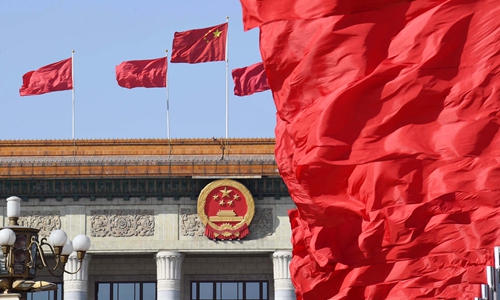HOME >> CHINA,SPECIAL-COVERAGE
Time to hold 'two sessions' not ripe amid outbreak; growth agenda remains on track: analysts
By Cao Siqi, Chen Qingqing and Zhao Yusha Source:Global Times Published: 2020/2/17 17:30:04 Last Updated: 2020/2/17 23:49:42

Photo: Xinhua
China is considering delaying the annual meetings of its top legislative body and its top consultative body, known as two sessions, which is believed to be the first since the country adopted the early March schedule in 1995, amid the outbreak of the novel coronavirus pneumonia (COVID-19) that has hampered production, travel and other activities.
Worries have been surfacing on the internet that China's national "two sessions" this year might be affected as the coronavirus epidemic, which has caused the delay of local "two sessions" in two provincial and 16 city-level administrations and a number of trade and cultural and sports events. Analysts said the postponement, if approved, is rare but within expectations. Some expect it to be postponed for two more weeks due to more positive signs of containing the virus, while some expect that the two sessions may be delayed to late March.
The Standing Committee of the 13th National People's Congress (NPC), China's top legislature, will convene its 16th bi-monthly session on February 24 in Beijing, which is expected to deliberate a draft decision to postpone the 3rd annual session of the 13th NPC.
The Chinese People's Political Consultative Conference National Committee held a meeting on Monday in Beijing to deliberate the postponement of the annual session of China's top consultative body.
Zhuang Deshui, deputy director of the Research Center for Government Integrity-Building at Peking University, told the Global Times that the decision will be made based on the current epidemic prevention and control work as it requires all officials to work at the frontline.
The proposal to delay indicates that the central government puts epidemic prevention and control work as its top priority, showing its highly responsible stance not only to the Chinese people but also to the work, Zhuang said.
Postponing the national two sessions is very unusual in the history of the Party, which has not been seen since the country's reform and opening-up reform.
However, the delay won't affect the government setting targets for overall economic and social development, as the NPC has begun planning major social and economic matters ahead of the plenary session, Zhuang said.
It's also unknown when the two sessions will be rescheduled as it depends on how the epidemic prevention and control work evolves, especially when there has been no inflection point of the epidemic in sight yet, Zhuang said.
The epidemic control work needs to take control of the flow of people, considering there will be more than 5,000 NPC deputies and national political advisers, not to mention staff to ensure the services support for the two sessions, as such an event will lead to a relatively concentrated people flowing to Beijing, putting pressure on the prevention and control work in the capital city, Wang Guangfa, a respiratory expert at Peking University First Hospital, told the Global Times.
There are nearly 3,000 deputies to the National People's Congress. Many of them, including one-third of the provincial and municipal leaders and leading officials in various fields, are fighting on the frontline of epidemic prevention and control and are playing an important role in their respective positions, Zang Tiewei, a spokesperson for the Legislative Affairs Commission of the NPC Standing Committee, told Xinhua.
In order to ensure that epidemic prevention and control work is concentrated and that the safety of the people and their health are the top priority, the chairperson's meeting has carefully evaluated and believes that it is necessary to appropriately postpone the convening of the third session of the 13th National People's Congress, he said.
Wang Hongwei, a professor at Renmin University's School of Public Administration and Policy, told the Global Times that this shows China's commitment to the international society to prioritize the taming of the virus. He estimated the two sessions will be postponed for two more weeks, as "we now are seeing more positive signs of containing the virus."
At this crucial time, participants of the two sessions shoulder great responsibility and pressure in containing COVID-19, and making plans to resume production as the virus pressed the pause button in China and dented its economy, Wang said.
Echoing Zhuang, Wang also believes the postponement will have little impact on Chinese politics and economy.
The "two sessions" are the annual gatherings of the NPC and the National Committee of the Chinese People's Political Consultative Conference, China's top political advisory body. The CPPCC National Committee plenary session normally kicks off on March 3 while the NPC plenary session starts two days later. Two sessions have drawn worldwide attention as they are regarded as the best window to view China.
The time for holding the national annual "two sessions" had not been fixed for quite a long time. In 1963, the fourth session of the second NPC opened on November 17 to review and approve the draft budget for the year. During the Cultural Revolution (1966-1976), the country's political life was disrupted and the "two sessions" schedule was erratic .
This situation has gradually improved since the 1980s. In 1985, the third session of the sixth NPC was held in the first quarter and has been fixed ever since. Since 1995, the NPC has held its annual session on March 5 except for 1997 when the NPC plenary session was held on March 1.
Zhu Lijia, a professor of public management at the Chinese Academy of Governance, told the Global Times previously that the national "two sessions" might be postponed as they cannot be held before the provincial and city level's versions, in which some issues and proposals from the local "two sessions" will be submitted to the national "two sessions" for deliberation.
RELATED ARTICLES:
Posted in: POLITICS,FOCUS